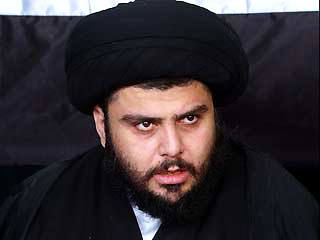Iraq's Shiite leader Moqtada al-Sadr urged Prime Minister Nouri al-Maliki on Wednesday not to run for a third term, accusing him of terrorizing Sunnis so that they don't go to the polls in the upcoming April 30 general election Al Arabiya reportred.
"I advise brother Maliki... brother Maliki thinks he served Iraq, let him rest for four years, and see if whoever comes next would serve better... if not let him come back after four years, it is not a problem," Sadr told reporters in Najaf, 60 kilometres south of Baghdad.
The Shiite leader, who had announced his withdrawal from active politics, accused Maliki's government of "building a dictatorship" by excluding candidates from the parliamentary elections.
"The decision to exclude candidates from the elections, regardless of who they were excluded...seeks to silent the right opposition voices and the voices that expose corruption," he said.
"Building of a dictatorship is clear, building of a one-party [system] is clear" he added.
He also accused Prime Minister Maliki of targeting Sunnis ahead of the elections.
"I know they want to marginalize the Sunnis so they don't vote, and they shelled and terrorized their provinces so they don't vote," the influential cleric said.
Campaigning for Iraq's April 30 general election opened on Tuesday, with Prime Minister Nuri al-Maliki bidding for a third term as his government grapples with the country's worst bloodshed in years, AFP reported.
Posters went up around Baghdad and across the country as candidates vie for one of 328 parliamentary seats.
No single party is expected to win an absolute majority and previous elections have seen lengthy periods of government formation.
Though not officially confirmed, the vote appears unlikely to take place throughout parts of the western desert province of Anbar, which has been wracked by violence since the beginning of the year, with militants holding control of an entire town on Baghdad's doorstep.
Iraqi voters have a laundry list of complaints, ranging from lengthy power cuts and poor running water and sewerage to rampant corruption and high levels of unemployment, to say nothing of near-daily attacks that have killed more than 2,200 people this year.
But elections in Iraq are rarely fought over political issues, with parties instead appealing to voters along sectarian, ethnic or tribal lines.






